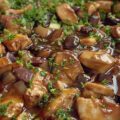What does Judaism have against shellfish?
Or pigs for that matter?
Why does Judaism care about what we eat?
Isn’t being a good person good enough?
These are valid questions that Jews have asked for generations, especially today as more and more people search for scientific backing to religious doctrine.
This is where the concept of “taamei mitzvot” comes in, which are explanations of some of the reasons behind God’s commandments that we humans can comprehend with our rational minds. While not acting as justifications for the commandments they do help us to perform them in a more whole and personal manner. In Hebrew the word for reason, “ta’am” also means taste. Connecting to a possible reason for a commandment adds flavor and zest to its performance.
When it comes to the laws of kashrut, there have been various reasons shared by rabbis throughout the generations as to why Judaism allows the eating of certain animals and prohibits others.
The requirement for an animal to be kosher is split hooves and chewing its cud. For fish, it’s having both fins and scales.
The average person reading the Torah might think these telltale signs are random and irrational. But, upon probing deeper, we learn otherwise.
The argument can be made that the laws of kashrut rest on the idea that we are what we eat.
Growing up, I remember hearing this idea many times from a television program I used to watch that taught kids about health. The host of the program would always say, “Eat healthy because, remember, you are what you eat!”
As a kid I just couldn’t wrap my head around that idea. I was literally the food I put into my body? As I got older and learned more about science, I realized, yes, the various components of the food I eat gets absorbed by my blood which provides nutrients to the trillions of cells in my body. So, yes, indeed, we are what we eat.
And the Torah, recognizing that fact, only permitted the eating of those animals that wouldn’t harm us physically or spiritually.
For starters, all kosher animals are herbivores. None of them are predators. They don’t hunt, attack or kill other animals for their food. Rather, they peacefully eat from the fields resulting in a demeanor the Torah prefers for us rather than the aggressive and violent nature needed to survive as a predator.
The well known medieval rabbi and physician Maimonides (1138-1204) taught, “There is nothing among the forbidden kinds of food whose injurious character is doubted.” From this we understand that eating a certain animal results in the taking on of some of the character traits of that animal. Again, we are what we eat.
Regarding pigs, Maimonides wrote, “The principal reason why Jewish law forbids pig's flesh is to be found in the circumstance that its habits and its food are very dirty and loathsome.”
Don’t want to be like a pig? Don’t eat them.
In a famous 13-century text, Sefer Ha-Chinuch (“The Book of Education”), the unknown author writes that “God knows that all of the foods that He distanced from His people…are injurious to the bodies, which are instruments of the souls…Therefore, He distanced us from them.”
If our food becomes our bodies and our bodies house our souls as well as affect our souls’ ability to function in this world, we must beware of the food we put into our bodies.
So why are shellfish prohibited by Judaism?
Is there something in their character that is detrimental to us physically and/or spiritually?
About this Nachmanides (1194-1270), another famous medieval rabbi, wrote the following:
“The rationale for fins and scales is that those that possess them always reside in the upper and clear portion of the waters, and they derive their growth from the air that enters there, and those that lack fins and scales always reside at the bottom of the waters, and in the dirt…thus they have a cold and sticky moistness that is close to fatal.”
While Nachmanides is not saying that the physical conditions of the fish are the reason for determining whether or not they are kosher, he is alluding to a “ta’am” – reason – of the mitzvah rooted in an observable reality that can assist people in observing a law that otherwise may seem overly mysterious and even random.
Not only Jews living in the modern scientific age are searching for a deeper understanding behind the mitzvot of Judaism. Some of the greatest rabbis throughout Jewish history did the same thing!

















